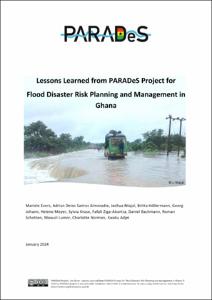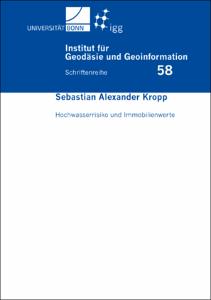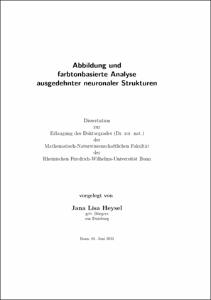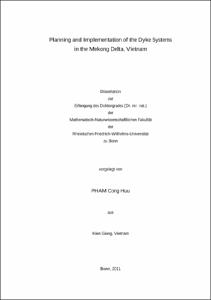Evers, Mariele; Delos Santos Almoradie, Adrian; Ntajal, Joshua; Höllermann, Britta; Johann, Georg; Meyer, Helene; Kruse, Sylvia; Ziga-Abortta, Fafali; Bachmann, Daniel; Schotten, Roman; Lumor, Mawuli; Norman, Charlotte; Adjei, Kwaku: Lessons Learned from PARADeS Project for Flood Disaster Risk Planning and Management in Ghana. Bonn: Department of Geography, University of Bonn, 2024.
Online-Ausgabe in bonndoc: https://doi.org/10.48565/bonndoc-195
Online-Ausgabe in bonndoc: https://doi.org/10.48565/bonndoc-195
@misc{handle:20.500.11811/11221,
doi: https://doi.org/10.48565/bonndoc-195,
author = {{Mariele Evers} and {Adrian Delos Santos Almoradie} and {Joshua Ntajal} and {Britta Höllermann} and {Georg Johann} and {Helene Meyer} and {Sylvia Kruse} and {Fafali Ziga-Abortta} and {Daniel Bachmann} and {Roman Schotten} and {Mawuli Lumor} and {Charlotte Norman} and {Kwaku Adjei}},
title = {Lessons Learned from PARADeS Project for Flood Disaster Risk Planning and Management in Ghana},
publisher = {Department of Geography, University of Bonn},
year = 2024,
month = jan,
note = {The PARADeS project focused on Ghana’s national flood disaster risk reduction and management strategy by investigating existing flood risk and mechanisms for disaster management, governance-policy, human-water interaction, and development of possible future scenarios and feasible and sustainable measures.
Three case study areas with different types of flooding were identified and chosen in a participatory flood risk-based process. These are including the catchments Odaw in Accra (pluvial, fluvial and coastal floods), Aboabo in Kumasi (pluvial and fluvial floods), and the White Volta (fluvial floods).
The project used innovative socio-technical and participatory approaches and tools that combines research, development, and institutional strengthening activities. It integrated diverse information, local knowledge and data sources and was developed collaboratively with stakeholder scenarios and socio-technical tools in order to support coherent decision-making processes. A key aspect was analysing different scenarios of flood hazards, investigating and modelling cascading risk effects regarding critical infrastructure, and an assessment tool to identify flood risk at a household level, the FLOODLABEL Ghana. All processes and working steps are realized using interdisciplinary and participatory approaches together with Ghanaian stakeholders.
The end products are strengthening institutional and citizens’ capacity through a series of activities on societal awareness and training of specialists, decision, and policymakers. Technologically, the project has produced a set of decision support tools (Flood Information Systems, FLOODLABEL Ghana, etc.) to effectively disseminate vital information to citizens, researchers, and decision makers to respond and mitigate the impact of flooding.
In pursuit of sustainable development in FDRM measures, we disseminated the outcomes and products, including technical tools, through reports and scientific publications. Additionally, we developed training materials tailored for students, experts, and decision-makers.},
url = {https://hdl.handle.net/20.500.11811/11221}
}
doi: https://doi.org/10.48565/bonndoc-195,
author = {{Mariele Evers} and {Adrian Delos Santos Almoradie} and {Joshua Ntajal} and {Britta Höllermann} and {Georg Johann} and {Helene Meyer} and {Sylvia Kruse} and {Fafali Ziga-Abortta} and {Daniel Bachmann} and {Roman Schotten} and {Mawuli Lumor} and {Charlotte Norman} and {Kwaku Adjei}},
title = {Lessons Learned from PARADeS Project for Flood Disaster Risk Planning and Management in Ghana},
publisher = {Department of Geography, University of Bonn},
year = 2024,
month = jan,
note = {The PARADeS project focused on Ghana’s national flood disaster risk reduction and management strategy by investigating existing flood risk and mechanisms for disaster management, governance-policy, human-water interaction, and development of possible future scenarios and feasible and sustainable measures.
Three case study areas with different types of flooding were identified and chosen in a participatory flood risk-based process. These are including the catchments Odaw in Accra (pluvial, fluvial and coastal floods), Aboabo in Kumasi (pluvial and fluvial floods), and the White Volta (fluvial floods).
The project used innovative socio-technical and participatory approaches and tools that combines research, development, and institutional strengthening activities. It integrated diverse information, local knowledge and data sources and was developed collaboratively with stakeholder scenarios and socio-technical tools in order to support coherent decision-making processes. A key aspect was analysing different scenarios of flood hazards, investigating and modelling cascading risk effects regarding critical infrastructure, and an assessment tool to identify flood risk at a household level, the FLOODLABEL Ghana. All processes and working steps are realized using interdisciplinary and participatory approaches together with Ghanaian stakeholders.
The end products are strengthening institutional and citizens’ capacity through a series of activities on societal awareness and training of specialists, decision, and policymakers. Technologically, the project has produced a set of decision support tools (Flood Information Systems, FLOODLABEL Ghana, etc.) to effectively disseminate vital information to citizens, researchers, and decision makers to respond and mitigate the impact of flooding.
In pursuit of sustainable development in FDRM measures, we disseminated the outcomes and products, including technical tools, through reports and scientific publications. Additionally, we developed training materials tailored for students, experts, and decision-makers.},
url = {https://hdl.handle.net/20.500.11811/11221}
}









